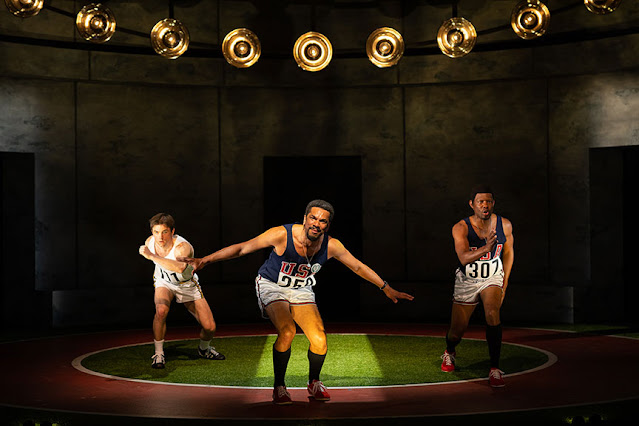A Well-Rounded and Clean Piece that Highlights an Important Historic Moment and How the Repercussions are Still Relevant Today.
 |
| (from left) Patrick Marron Ball as Pete, Biko Eisen-Martin as John Carlos (Los), and Korey Jackson as Tommie in The XIXth. Photo by Rich Soublet II. |
Seeing plays based on actual, historical events usually leads to a fascinating rabbit hole with research, references, and wanting to know more. The Old Globe's latest, The XIXth (The Nineteenth), a world premiere by Kemp Powers, directed by Carl Cofield, was definitely not the exception. It had me searching for old clips and facts about that historical day during the 1968 Olympics.
I was excited to see this new piece because 1968 was a charged year in Mexican history. It was the first Olympics ever in a Latin American country, Mexico was also the host of the World Cup; and atrociously, it too was the Tlatelolco student massacre at the National College, ten days before the games started. Kemp Powers' piece focuses on the protest by Black American sprinters Tommie Smith (Korey Jackson) and John Carlos (Biko Eisen-Martin) that entailed raising their fists and being shoeless at the podium highlighting segregation, racism, and poverty. The Silver medalist, Australian sprinter Peter Norman (Patrick Marron Ball) also participated in the protest by wearing a badge that read “Olympic Project for Human Rights”. And, as it happens in many countries when sporting protocols get mixed with politics, the three athletes never got to run professionally or in any other Olympic games again. Years later, Pete passes away and Tommie and John Carlos travel to Australia to say their goodbyes while there is a faint intention of clearing the air polluted by the negative outcome that has haunted the all these decades later.
 |
| (from left) Patrick Marron Ball as Pete and Christian Coulson as Neville in The XIXth. Photo by Rich Soublet II. |
 |
| Kimberly Scott as Dora and Korey Jackson as Tommie in The XIXth. Photo by Rich Soublet II. |
The three main actors Korey Jackson, Biko Eisen-Martin, and Patrick Marron Ball are flawless. Carl Cofield's direction shined through as each dialogue/monologue was articulated taking its time and landing with a melodic pace, which is important to the chronicle as the actors go back and forth in age, so the tone and intention were delivered well. Same with Michael Early and his heated argument scenes being interpreted with poise and calculation. The rest of the cast did a marvelous job as well starting with Pete's coach Neville (Christian Coulson) who is the one that introduces the drama and has a comedic tone throughout the piece that alleviates some of the tension. Kimberly Scott as Dora, Tommie's mom, has a brief but mighty participation giving joy, pride, history, culture, and everything! and Mark Pinter with his deep, projecting voice playing Avery, the president of the International Olympic Committee at the time and who was nicknamed in the play (and probably in real life too) "Slavery Avery". Pinter always gives a nice ludic balance between intention and stoicism. It is part of his acting style and he does it so well. Seeing him onstage is always a joy.
 |
| (from left) Korey Jackson as Tommie and Michael Early as Jesse Owens. Photo by Rich Soublet II. |
Mika Eubanks recreated the uniforms and looks from those games with a costume design that had a light of its own also contributing to the aging factor of the characters.
Going through videos and photos regarding that historic moment of the Black Power Salute, I can say that Caparelliotis Casting was spot on. It is not an easy task to recreate these narratives as sometimes they can become cartoonish. Not the case here. The XIXth (The Nineteenth) is a touching piece handled delicately to deliver a powerful message that has lingered and is pretty much alive today a million years later. It is a one-act play but, because of how layered and charged it is, it should include an intermission. Other pieces are so full of everything and running nonstop that there is no room for air. If a break is included, the audience and momentum will be lost. With The Nineteenth there is plenty of room for an intermission to give audiences time to reflect and digest what is happening. Once the plot is mostly grasped, coming back from intermission will allow an even bigger reaction and setting. But that's just me. Go see for yourself and let me know.
Currently playing until April 23, please click here for performance dates, times, and ticket prices.

No comments:
Post a Comment